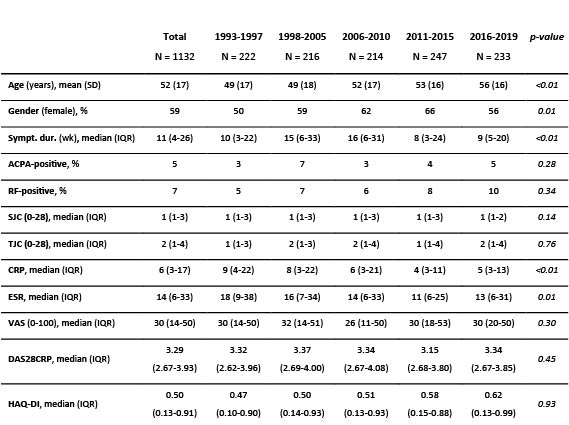Session Information
Date: Saturday, November 6, 2021
Title: Miscellaneous Rheumatic & Inflammatory Diseases Poster I (0183–0209)
Session Type: Poster Session A
Session Time: 8:30AM-10:30AM
Background/Purpose: International guidelines stress timely DMARD-initiation in early arthritis, also when classification-criteria are not yet fulfilled. Consequently, undifferentiated arthritis (UA)-patients are increasingly treated despite placebo-controlled evidence for DMARD-effectivity in UA. Furthermore, since the introduction of the 2010 classification-criteria, the UA-population changed and trials including UA-patients not fulfilling the 1987- and 2010-criteria are absent. With 25-years of observational data, using inclusion-period as instrumental variable for DMARD-treatment, we studied whether enhanced treatment-strategies improved (long-term) outcome in UA.
Methods: UA was defined, in retrospect, as clinical arthritis neither fulfilling the 1987 nor the 2010 criteria for RA, nor any other distinct diagnosis. In total, 1132 UA-patients, consecutively included in the Leiden Early Arthritis Clinic between 1993-2019, were studied, divided into 5 inclusion-periods; 1993-1997, 1998-2005, 2006-2010, 2011-2014, 2015-2019. Frequency of DMARD-initiation was compared between the inclusion-periods as were the following outcomes: DAS28CRP and HAQ-DI during follow-up, prevalence of DMARD-free status (DFS; spontaneous remission or sustained remission after DMARD-stop) and progression to RA (according to the 1987 and/or 2010-criteria).
Results: The current UA-population has relatively mild disease; median SJC 1, TJC 2 and median HAQ 0.6. DMARD-treatment increased from 17% (1993-1997) up-to 52% (2015-2019), in which methotrexate became more common in the last decade. DAS28CRP during follow-up improved from 2011 onwards (range;-0.18,-0.25/p< 0.05). HAQ-scores remained similar (range;-0.00,-0.09/p >0.05), as did DFS-prevalence: 57%, 58%, 59% (1993-1997/1998-2005/2006-2010;p=0.59). Also, the percentage of patients that developed RA did not decrease (14%/21%/26%/18%/27% in the respective inclusion-periods).
Conclusion: Although intensified DMARD-treatment in UA might have led to lower disease activity scores, functionality and long-term outcomes did not improve, indicating potential overtreatment. Stratification methods for the up-to-date UA-population, to identify patients that will develop RA, are warranted.
DAS: disease activity score, CRP: C-reactive protein, HAQ-DI: Health Assessment Questionnaire Disability Index, DFS: DMARD-free status, RA: rheumatoid arthritis.
ACPA: anticitrullinated protein antibody, CRP: C-reactive protein, DAS: disease activity score, ESR: estimated sedimentation rate, HAQ-DI: health assessment questionnaire disability index, SJC: swollen joint count, TJC: tender joint count, VAS: visual analogue scale.
To cite this abstract in AMA style:
Verstappen M, Matthijssen X, van der Helm-van Mil A. In Undifferentiated Arthritis, DMARD-treatment Intensified During the Last Decennia but Did Not Result in Improved Outcomes [abstract]. Arthritis Rheumatol. 2021; 73 (suppl 9). https://acrabstracts.org/abstract/in-undifferentiated-arthritis-dmard-treatment-intensified-during-the-last-decennia-but-did-not-result-in-improved-outcomes/. Accessed .« Back to ACR Convergence 2021
ACR Meeting Abstracts - https://acrabstracts.org/abstract/in-undifferentiated-arthritis-dmard-treatment-intensified-during-the-last-decennia-but-did-not-result-in-improved-outcomes/


